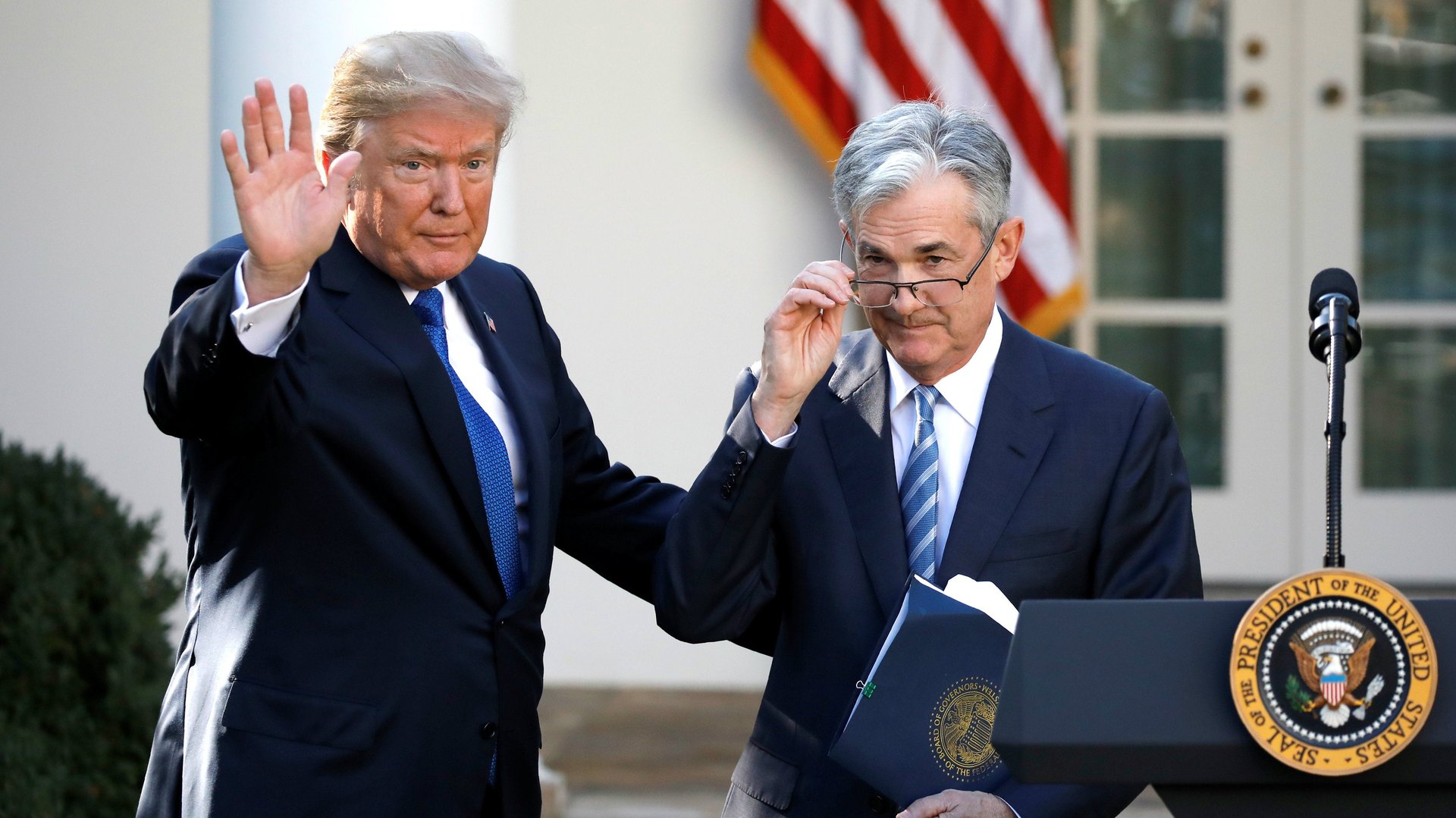Trump created the strong dollar he is now skewering the Fed about
Imagine a president with a strong grasp over his political party, and an opposition that’s struggling to find its feet. He’s become an open critic of his country’s rising interest rates and questioned the judgment of the country’s central bank, which is supposed to be independent. He has a shaky view on whether a stronger or weaker currency is better for his country economically. Among the advisors in senior government roles giving him guidance is his son-in-law.


Imagine a president with a strong grasp over his political party, and an opposition that’s struggling to find its feet. He’s become an open critic of his country’s rising interest rates and questioned the judgment of the country’s central bank, which is supposed to be independent. He has a shaky view on whether a stronger or weaker currency is better for his country economically. Among the advisors in senior government roles giving him guidance is his son-in-law.
Up until this week, this clearly described Turkish president Recep Tayyip Erdogan, whose open battles with the central bank have plunged the Turkish lira into new depths, stoking inflation and destabilizing the economy in the process. Now, this description also applies to Donald Trump.
In an interview with CNBC, the US president described himself as “not thrilled” by recent rate hikes by the Federal Reserve. “I don’t like all of this work that we’re putting into the economy and then I see rates going up,” he added.
“Our currency is going up,” he said. “I have to tell you, it puts us at a disadvantage.”
Trump’s comments are just one more of the ways that he’s broken with long-held political norms. For decades, presidents have resisted discussing interest rates and the currency, for fear that markets might question the independence of the central bank. (To see what that looks like, consider Erdogan in Turkey.) After the CNBC interview was published, the dollar index, which tracks the greenback against major currencies, dropped sharply. Earlier in the day, the index had reached its highest level of the year.
The White House said that “of course the president respects the independence of the Fed.” Today, though, Trump doubled down on his second-guessing of Fed policy, using his favorite platform.
At the time of writing, the dollar index was down 0.6% on the day:
It’s unlikely that the Fed officials will change tack because of Trump’s comments. Earlier this week, Fed chair Jerome Powell said that the central bank plans to raise interest rates gradually. There have already been two hikes this year, and most bank analysts expect two more before the end of the year.
One of the contradictions in Trump’s comments is that he recently picked Powell to take over the Fed, so he knows his policy preferences. “I put a very good man in,” he told CNBC, even as he questioned the wisdom of the Fed’s actions.
On the dollar, Trump is right: It is strong. It has climbed 6% against the euro in the past three months, 4% against the Japanese yen, and 8% against the British pound. It is stronger than most currency analysts were anticipating at the start of the year.
Much of this strength is of Trump’s own making. He introduced fiscal stimulus in the form of tax cuts, spending increases, and deregulation. With the economy already humming—unemployment has fallen to historic lows—the Fed has to keep raising rates to stop the economy from overheating.
Meanwhile, Trump’s tariffs and plans to escalate a trade war with China adds to the troubles of already slowing economies of China and Europe. Traders are delaying forecasts for when the European Central Bank will finally be able to raise interest rates, while expectations that China’s central bank will ease policy are also mounting. This is weighing on the euro and the yuan, which means more money flows into the dollar. In the CNBC interview, Trump also said he was ready to impose tariffs on all Chinese imports. This threat is also likely to keep the yuan down. It’s already the worst performer among 31 major currencies in the past month.
Analysts at MUFG Bank point out another flaw in Trump’s logic. “The reduction in domestic savings from fiscal stimulus and the stronger US dollar will encourage a wider trade deficit, which is exactly what President Trump is looking to reduce through protectionist trade policies,” they wrote in a research note.
Unpicking what Trump really wants for the dollar is hard to figure out, and history isn’t much of a guide. Before he took office he said that the dollar was too strong and it might need to come down (paywall). “Having a strong dollar has certain advantages, but it has a lot of disadvantages,” he added. Then, earlier this year, he said “ultimately, I want to see a strong dollar.”
Trump’s convoluted comments about the dollar have led to short-term drops in the market, but more fundamentally investors appear to respond more to the actual actions he and the Fed have taken. For now, that adds up to higher interest rates and a stronger dollar.